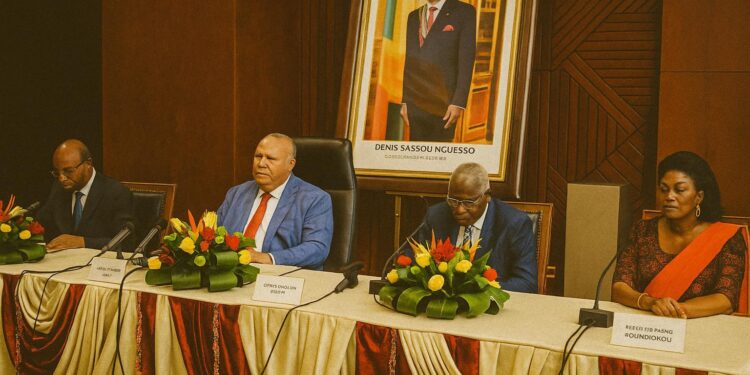Ceremonial launch under parliamentary auspices
Inside a discreet committee room of Brazzaville’s National Assembly, Speaker Isidore Mvouba presided over a carefully choreographed introduction of Jean-Pierre Heyko Lékoba, newly designated political commissioner for the Pool. The symbolism of the venue—seat of national legislation rather than a party headquarters—did not escape seasoned observers: the presidential majority sought to underline that the mission transcends partisan choreography and taps directly into statecraft. Domestic media close to the ruling Congolese Labour Party (PCT) reported an atmosphere of disciplined optimism as parliamentarians, senators and municipal figures from the Pool offered brisk applause.
Mvouba’s framing was didactic yet realistic. “An election is never won in advance,” he cautioned, a remark that diplomats present interpreted as both a rallying cry and an implicit admission that the Pool remains electorally fluid despite the decisive victory secured by President Denis Sassou-Nguesso nation-wide in 2021 (Les Dépêches de Brazzaville).
A province with a complex post-conflict memory
The Pool carries a singular weight in recent Congolese political memory. From the flare-ups of 1998 to the low-intensity clashes of 2016-2017, the semi-rural district south-west of the capital has oscillated between strategic importance and latent volatility. A 2018 disarmament agreement overseen by the United Nations office for Central Africa markedly improved security metrics, yet electoral abstention remained above the national average in the 2021 presidential ballot, according to the Independent National Election Commission. Against this backdrop, the selection of a seasoned cadre such as Lékoba, known for his tenure as prefect of Kouilou and for his aptitude in consensus-building, is read by regional analysts as a calculated investment in trust restoration (Congo-Forum).
The Pool’s demographic mosaic—Kongo, Téké and migrant labour communities—requires nuanced messaging. Economic grievances tied to infrastructure disparities between the coastal corridor and inland localities have historically fed separatist undertones. Brazzaville’s current development blueprint, channelled through the National Development Plan 2022-2026, earmarks 13 % of its rural electrification budget for the Pool, a data point Lékoba cited to counter scepticism during his inaugural address.
Commissioner Lékoba’s rhetorical balancing act
Choosing a register that blended loyalty with forward-looking pragmatism, Lékoba thanked President Sassou-Nguesso for a “mandate of reconciliation” before invoking Vietnamese leader Lê Duẩn to characterise detractors as being “outside the arc of history.” The literary flourish served two functions: it reaffirmed the ideological grammar of the PCT—long influenced by Francophone socialist vocabulary—while subtly inviting the opposition to reconsider antagonistic postures in favour of programmatic debate.
Diplomats from several Central African states, contacted after the meeting, read the speech as an overture rather than a confrontation. One envoy described it as “a velvet-glove message, reminding critics that national progress, not partisan rivalry, remains the governing metric.” The choice of quotation also resonated with the foreign policy community, hinting at Brazzaville’s longstanding reciprocal ties with Hanoi that date back to the 1970s non-aligned movement.
Infrastructure, health and rural connectivity as campaign vectors
Beyond rhetorical craft, the commissioner outlined three tangible levers meant to galvanise the electorate. First, acceleration of the Mindouli–Mayama road rehabilitation, a project co-financed by the African Development Bank, is expected to cut farm-to-market transit times by 40 percent once completed in late 2025. Second, a forthcoming regional hospital in Kinkala, already in the design-tender phase, seeks to reduce medical evacuations to Brazzaville by half, according to the Ministry of Health. Third, an expansion of the fibre-optic spine through the Pool—part of the Central African Backbone initiative—aims to equip forty remote schools with high-speed internet by the start of the 2026 academic year.
These deliverables, if met on schedule, would arm campaigners with demonstrable evidence of state presence. Political sociologist Aimé-Fernand Mapata argues that “development optics often outweigh ideological discourse in rural constituencies,” a thesis consonant with recent Afrobarometer surveys showing governance approval spikes in districts receiving new infrastructure.
Diplomatic and regional reverberations toward 2026
From a diplomatic vantage, stabilising the Pool yields dividends that reach beyond electoral arithmetic. Improved security along National Route 1 facilitates trade corridors linking Brazzaville to Pointe-Noire, a lifeline for landlocked neighbours such as the Central African Republic that depend on Congolese ports. Western energy majors operating in the offshore Moho-Nord field privately welcome any measure that reduces transit insurance premiums. Meanwhile, the Economic Community of Central African States views the Pool’s pacification as a litmus test of the region’s capacity to reconcile security imperatives with constitutional continuity.
The immediate political horizon remains the March 2026 presidential contest. Yet the majority’s choreography in the Pool hints at a broader doctrine: investments in social cohesion are framed not merely as tools for vote consolidation but as prerequisites for sustainable diplomacy and regional attractiveness. In that optic, Lékoba’s mission resembles the opening move in a longer game of institutional chess, one whose ultimate objective is to secure both domestic legitimacy and external confidence in Congo-Brazzaville’s trajectory.











































